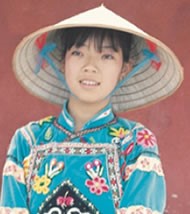Qabiao, Pubiao in China

Photo Source:
Copyrighted © 2026
Operation China, Asia Harvest All rights reserved. Used with permission |
Send Joshua Project a map of this people group.
|
| People Name: | Qabiao, Pubiao |
| Country: | China |
| 10/40 Window: | Yes |
| Population: | 500 |
| World Population: | 1,300 |
| Primary Language: | Qabiao |
| Primary Religion: | Ethnic Religions |
| Christian Adherents: | 0.00 % |
| Evangelicals: | 0.00 % |
| Scripture: | Translation Started |
| Ministry Resources: | No |
| Jesus Film: | No |
| Audio Recordings: | No |
| People Cluster: | Tai |
| Affinity Bloc: | Southeast Asian Peoples |
| Progress Level: |
|
Introduction / History
The Qabiao call themselves Ka Biao. In China the Qabiao have been officially included under the Yi nationality. The Chinese commonly call the Pubiao Bendi Lolo, which means "indigenous Lolo."
The Qabiao people are evenly distributed on both sides of the China-Vietnam border. The Qabiao in China live near the Vietnam border in the Tiechang, Matong, Punong, Pucha, and Pufeng villages of Malipo County in the Wenshan Zhuang-Miao Prefecture of Yunnan Province. The Vietnam Qabiao are located in seven communes of Dong Van District in Ha Giang Province.
What Are Their Lives Like?
For centuries Qabiao society has been monogamous. Today it is strictly forbidden for people of different generations to marry.
Until recently, Qabiao women wore two vests, in addition to ankle length skirts. Lately they have abandoned wearing the outer vest and have only retained the inner one. This vest, called bok tam, has five panels and buttons under the right armpit. At the hems and around the neck and sleeves, bands of colored cloth are sewn which are similar to those adorning the costumes of the Giay. Qabiao women commonly draw their hair forward and hold it in place with a comb.
What Are Their Beliefs?
The Qabiao are animists. They believe a person has eight souls and nine spirits. These souls and spirits govern their existence and guide their activities. These beliefs shape the entire life and worldview of the Qabiao. The most revered place in a Qabiao home is the altar, reserved for three generations of ancestors. Each generation is symbolized by a small sandstone jar. They believe a dried pumpkin and a bundle of oxtail hair attached to a stick enable the ancestors to recognize their descendants.
Many Qabiao customs are directed at preserving their unique culture, which makes it difficult for the gospel to reach their minds with the message of the Savior. At funerals the Qabiao offer prayers to the soul of the dead person. They read texts reflecting the Qabiao concept of the universe, of mankind and of their community. Some legends include a great flood in the past; the only survivors were a few who hid in a giant hollowed-out pumpkin. This may be one key to introducing the gospel message to the unreached Qabiao.
What Are Their Needs?
The Qabiao people need to recognize the risen Lord Jesus Christ, who is alive and unlike their dead ancestors can answer their prayers and meet their needs.
Prayer Points
Pray that believers in China and Vietnam will answer the call to share the gospel with the Qabiao people.
Pray that they will have a revelation of the living God and understand that they were created to be in a relationship with him.
Pray that the Lord would produce fertile soil in their hearts so they will understand and accept the gospel when they are exposed to it.
Pray for a great spiritual awakening among the Qabiao in this generation.